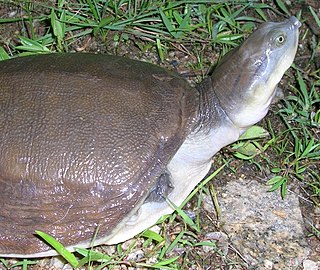
The Pterophoridae or plume moths are a family of Lepidoptera with unusually modified wings. Though they belong to the Apoditrysia like the larger moths and the butterflies, unlike these they are tiny and were formerly included among the assemblage called "microlepidoptera".

Gelechioidea is the superfamily of moths that contains the case-bearers, twirler moths, and relatives, also simply called curved-horn moths or gelechioid moths. It is a large and poorly understood '"micromoth" superfamily, constituting one of the basal lineages of the Ditrysia.

Cylindroleberididae is a family of ostracods that shows remarkable morphological diversity. The defining feature is the possession of gills: 7–8 leaf-like pairs at the posterior of the body. Other features common to all species in the family include a "baleen-comb" on both the maxilla and the fifth limb, a sword-shaped coxal endite on the mandible, and the triaenid bristles on the basal endites of the mandible.

Lissemys is a genus of softshell turtles in the subfamily Cyclanorbinae of the family Trionychidae. The genus is indigenous to southern Asia.

The Podocopa are a subclass of ostracods. Members of the subclass Podocopa can be differentiated from the other subclass of ostracods (Myodocopa) by the morphology of the second antenna: the Podocopa have a relatively long endopod, whereas the Myodocopa have a relatively long exopod. The seventh limb of the Podocopa has a variety of forms or is absent, but is never an annulated worm-like limb.
Polycopidae is a family of marine ostracods. Its members are related to animals in the suborder Halocypridina, but are sufficiently distinct to be placed in the sub-order Cladocopina. There is even some speculation that a separate order may be warranted. The genera in the family differ from the other suborder, Halocypridina, in several features: the central adductor muscle scars are in a triangular or half-rosette pattern, they lack sixth and seventh limbs, and the maxilla has both an exopod and endopod.
Spelaeoecia is a genus of crustaceans in the family Thaumatocyprididae. One species, the Bermudan endemic S. bermudensis, is listed as critically endangered on the IUCN Red List. It contains the following species:

Cerithiidae, common name the cerithiids or ceriths, is a large family of medium-sized marine gastropods in the clade Sorbeoconcha.

Procerithiidae is a taxonomic family of sea snails, marine gastropod molluscs in the clade Sorbeoconcha.
Theelia is an extinct genus of sea cucumbers that existed from 312 to 40.4 million years ago.

Issidae is a family of planthoppers described by Spinola in 1839, belonging to the order Hemiptera, suborder Auchenorrhyncha superfamily Fulgoroidea.
Heinz Walter Kozur was a German paleontologist and stratigrapher.
Vjalovognathus is an extinct genus of conodonts.
Misikella is an extinct genus of conodonts.

Telenomus is a genus of parasitoid wasps from the subfamily Telenominae. The genus was first described by Alexander Henry Haliday in 1833. Species in this genus parasitise the eggs or immature stages of other insects.
The following is a taxonomy of extant (living) Brachiopoda by Emig, Bitner & Álvarez (2019). There are over 400 living species and over 120 living genera of brachiopods classified within 3 classes and 5 orders, listed below. Extinct groups are not listed.
Cytherella is a genus of seed shrimp in the family Cytherellidae.

Amphissites is an extinct genus of ostracod belonging to the suborder Beyrichicopina and family Amphissitinae. Species belonging to the genus lived from the Devonian to the Permian in Europe, North America, Australia, and east Asia. The genus were likely deposit-feeders, and may have survived briefly into the Triassic.
Humphreysella is a genus of ostracods within the family Thaumatocyprididae, containing 11 species. Members of this genus are filter feeders, and can range from sizes of .5 to 32 millimeters in length.









